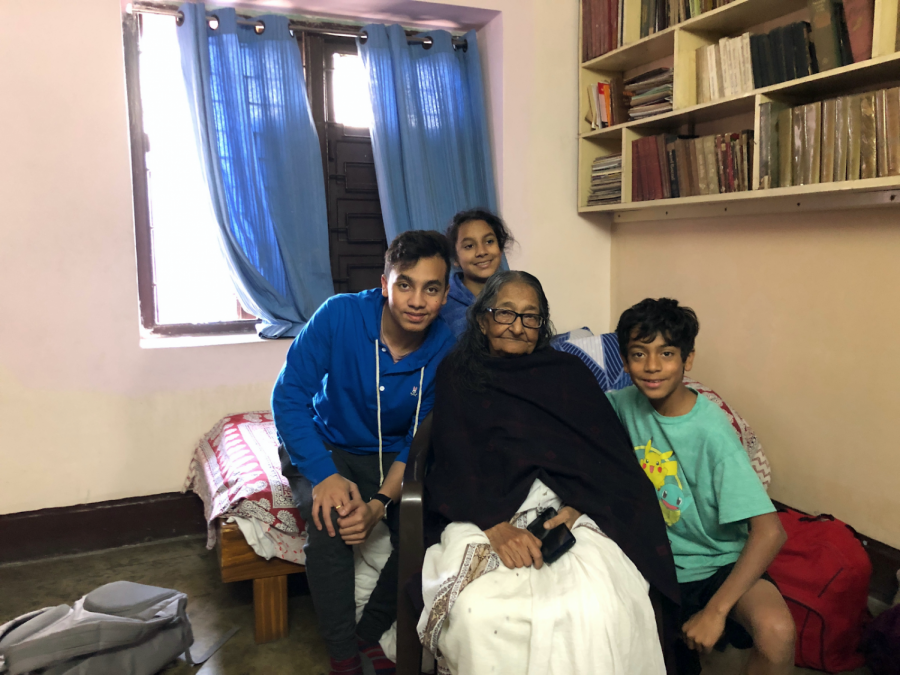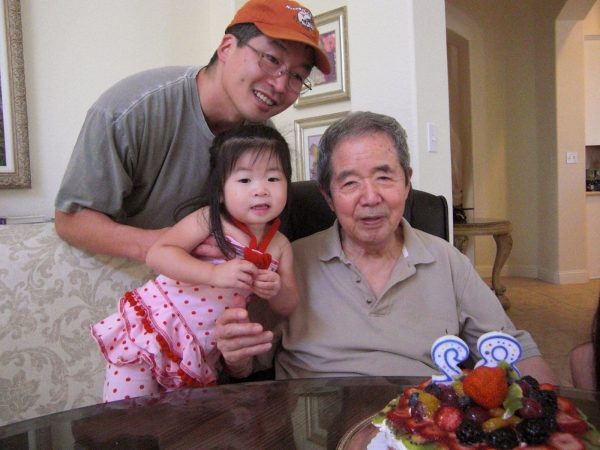Student grieves grandma from halfway across world amidst COVID-19
Mehuli poses with her Thamma and siblings
As I locked myself in the downstairs bathroom, stifling the sobs that threatened to break through, one painful thought kept tormenting my mind.
I never got to say goodbye.
Aug. 24 was a regular Monday evening. I was in my room stressing about my Economics final exam. I was scrambling to get my homework done so I had time to study. I stared resentfully at all the papers scattered on my desk — my incomplete Spanish homework, my physics worksheet covered in eraser marks, the 10 pages of APUSH reading waiting for me. I cringed at the thought of another late night of working. Even though we were just in the second week of school, junior year was already overwhelming. But suddenly my mom texted me, and my heart sank. I dropped everything I was doing.
“Thamma passed away. Please come down with Rohan.”
See, school stress wasn’t the only thing on my mind. While I was worrying about my homework, thousands of miles away, my grandma was fighting for her life in the hospital. She had been in and out of the hospital since May. My dad would always say she was strong, that she would pull through. And she did — numerous times. But her strength had to run out eventually.
Rohan, my younger brother, was playing Rainbow Six Siege on his PC in his room. I silently walked in.
“Come down.”
“But I’m in the middle of a rou—”
“Come down now.”
He could tell by the tone of my voice that something was wrong. Really wrong. He removed his headset and turned to look at me, concerned.
“Thamma passed away,” I said softly. “We need to go downstairs.”
I walked downstairs in a daze. My mom was comforting my dad, who was silently sobbing on the couch. Tim, my older brother, was cleaning the kitchen counter while Rohan stood to the side. None of us knew what to say or do. I wanted to be strong for my dad, but tears were starting to fall. I quickly walked to the bathroom and locked myself in. When I came out, my mom was hugging Rohan. “I should’ve written to her more,” he was saying in a shaky voice. I tried to speak, but my voice wasn’t steady enough. We sat on the couch in silence. I wanted to comfort my parents while they comforted us, but I didn’t know how.
I didn’t really know my grandma. She lived in Calcutta, India, a 17-hour plane ride away. She spoke Bengali and didn’t know English very well. I don’t speak a word of Bengali. We traveled to India to see her nearly every winter break, but it never felt like enough.
However, even with the geographic and language barrier, we bonded in different ways. Whenever we came to India, she would always buy our favorite tea biscuits and keep them for us. She would ask us about school, our activities, our lives. She would always listen. She would make us luchi and fish fries because she knew we loved them. She would take us down to the market outside her apartment and buy us whatever we wanted — biscuits, sweets, samosas.
The last time I traveled to India was the winter break of my freshman year. My mom, my younger brother and I were there for two weeks, and we stayed in my grandma’s apartment. My brother and I mainly kept to ourselves, either playing games with each other, watching TV or reading books. We would go down to the market with her or drink our hourly tea with her, but other than that, we didn’t spend much time with her.
As I reflected on all of my memories with my grandma, my eyes filled with tears of remorse. I wished I had known that those two weeks in freshman year would be the last time I would see her.
Had this been a regular year, my parents would’ve booked us a flight to India as soon as my grandma’s health started declining. We would’ve been able to see her and talk to her one last time. We would’ve been able to say goodbye.
Instead, my grandma passed away alone in a hospital room while we grieved thousands of miles away. COVID-19 took away my chance to say goodbye to my grandma.
Surrounded by my grieving family, a variety of emotions flooded my mind. Grief and sadness, but mainly regret. Regret for not spending more time with her when I had the chance. Regret for not writing to her more. Regret for never doing anything to get closer to her. I didn’t know her well, and it felt like that was my fault.
That evening when I went back upstairs, I looked back through my WhatsApp messages to her, and I was overwhelmed with remorse, thinking about how much more I could have said to her. And when I read her responses — poetic, considerate, filled with love — it reminded me of how much she loved me. My parents always told me to write to her more, but I never did — and now I can never write to her again.
One of the things my grandma cared most about was treating women with dignity. She cared deeply about making sure women could be financially independent. In her honor, my parents plan on creating a scholarship in her name, in which struggling women can receive monetary support to help them become successful. This is how we will honor her legacy.
Even though I don’t have many memories with my grandma, I am grateful for the ones I do have. Although brief, they’re fond and meaningful. There will always be regrets surrounding my grandma’s death — regrets for not talking to her more, for not making more of an effort, for not building a strong enough relationship. I can wallow in the guilt and sorrow of all these regrets, letting them drag me down. But I now understand that dwelling on what we didn’t have won’t help me. Instead, I can remember and cherish what we did have — and never let it go.






